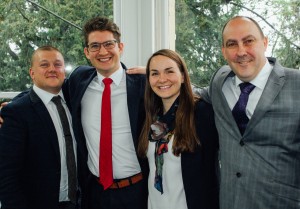In the first of three Bristol Business News blogs, Brady George, managing director of facilities management firm Almeda, discusses the important factors that will help shape the cities of tomorrow.
I was delighted to hear that Bristol was this week named as the country’s leading smart city outside London in a report published by Huawei UK. 
The region is particularly strong in using technology to deliver services in an economically viable and sustainable way and we have seen the city fast becoming known as a national and international digital, creative and entrepreneurial hub.
But building the cities of tomorrow is not without its challenges and the report also identified important factors which need to be addressed for cities to become smarter.
Transport infrastructure
Transport is one issue that will define the future of our cities and no issue is arguably more controversial in Bristol and the surrounding region.
We are officially the most congested city in the UK outside of London. This is amplified by schemes such as resident parking zones, traffic-calming measures and pedestrianisation, which is making it difficult for residents to get around easily as well as people commuting to the city.
We embrace policies to help improve the environment and reduce carbon emissions. Traditional initiatives such as public transport and newer initiatives such as bike-sharing and car-sharing are helping to ease congestion and are contributing to our goal of becoming a ‘green’ capital.
But all this lacks 100% impact unless the bigger issue of creating a joined up infrastructure plan – not just around Bristol but between Bristol and surrounding towns such as Weston-super-Mare – is addressed. It needs to be easier not just getting around the city but getting from to town and places outside of the city via a public transport network.
For example – it’s still too much of a hassle getting quickly from Portishead to Bristol if you don’t have a car.
Integrated Mobility Plans
To achieve this, an Integrated Mobility Plan could be implemented in Bristol. This joins mobility planners with other city sectors to discuss the transport goals they have in common, opposing goals and how they can work together to satisfy everyone’s common interest.
IMPs need to look at finance and regulation, political commitment and complete collaboration to ensure one external influence, who may not understand the challenges faced, doesn’t have the monopoly on resources.
Property and development
Moving onto property and its role as a smart city, Permitted Development Rights (PDR) is a pertinent issue. PDR is a national grant of planning permission which allow certain building works and changes of use to be carried out without having to make a planning application.
Bristol is seeing the highest take up of PDR outside of the capital. Buildings are literally being flipped and converted for fun. This is improving life for residents and putting lots of obsolete stock to good use; but it is also pushing prices up and throttling growth for some businesses.
If you’re an SME based in serviced office space, taking the next quantum leap and moving into new office is now more difficult, as much of the previously available space has been turned into residential properties.
Whilst not necessarily a problem for big national or larger firms, it is reducing office stock and if we’re going to be an even smarter city we needed to ensure there is space for businesses and entrepreneurs to grow and prosper.
Building the smart cities of the future
Transport infrastructure and lack of commercial office space available in the city centre are just two issues that could affect business growth in the city and the attraction of new talent.
Here at Almeda we are proud to look after some of the region’s most iconic and celebrated buildings – which is why we take our role as a cog in the city’s glorious future, seriously.
Pictured: Brady George, second from left, with his senior team, Gordon Cox, Brady George, Louise Coles and Ben Arbery





























